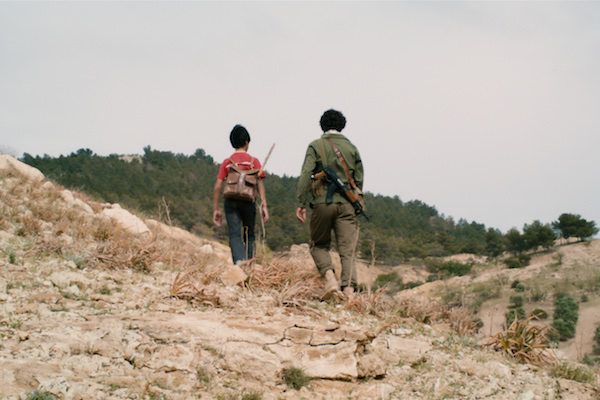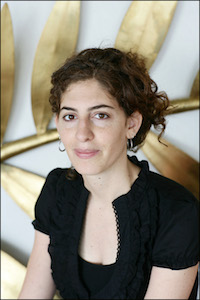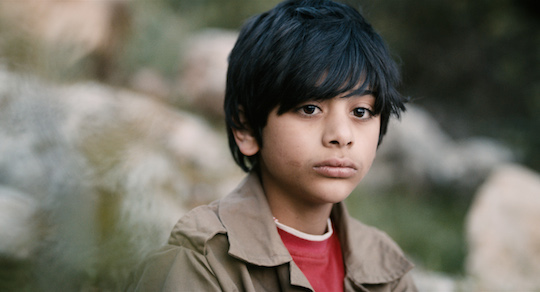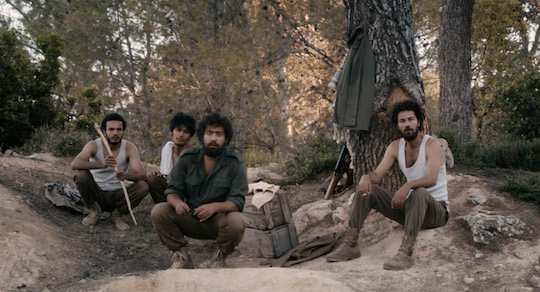‘When I Saw You’ tells the story of a Palestinian child in 1967 who refuses to accept his fate as a refugee. Writer and director Annemarie Jacir discusses what led her to make the film and what lessons its carries.
By Frank Barat
Returning to Palestine is a recurring theme in Annemarie Jacir’s films. Unlike the majority of Palestinians, who are refugees, Jacir was able to return to her hometown Bethlehem every year to visit family while growing up, something she describes as “the privilege of Palestine.” In 2008, however, she was denied entry, separated from her partner and left feeling like a modern-day refugee. That experience, she says, inspired her latest film, “When I Saw You.”
Set in the refugee crisis surrounding the 1967 war, the film centers on a Palestinian boy who refuses to accept his fate as a refugee; he doesn’t understand why he can’t simply return home. By telling the story through the eyes of a child, Jacir is able to boil down the Palestinian refugee issue into one simple question: “If you walked away, why can’t you walk back?”
“The Wall Has Ears: Conversations for Palestine” sits down with Annemarie Jacir ahead of her film’s premier in Belgium.
Your last two films “Salt of this Sea” and “When I Saw You” are both highly political. So for you, is everything political?
I always get asked by the press, by other filmmakers and especially European journalists: do you think you can do something not political, not about Palestine? Yes, of course, I can do that. I could make a science fiction movie tomorrow. But we live in this world, and this is what’s happening. I do think there is a real effort made to separate artists from politics. They say art should not be about politics, you should be above that. No, I do not agree with that at all. We are part of our societies. We live within them. Look, it’s difficult to make independent cinema, but it’s also a privilege. You are working with people, you are telling a story, have an audience, so for me, you have duty to be part of the world around you. I don’t feel like I represent Palestine or the Palestinians, but at the same time, these stories come from real places, people, real experiences in life.
The concept of return is very present in both of your films. For Palestinians, the concept of return is key. In your personal experiences, your own story, your family, do you also have a story of exile in your life?
The majority of the Palestinians are refugees; they have never seen Palestine. But my experience is different. I had what I call the privilege of Palestine. All my life I was going back and forth. My grandparents, aunts and uncles lived in Bethlehem, so we were able to come in and out and we spent three or four months of the year in Palestine ever since I was a baby. So I have known Palestine all my life and it’s the one place that has always been constant. For me, it’s home.
Later, I was denied entry and found myself in Jordan five years ago. I suddenly found myself in the position of most Palestinians. I was looking at Palestine from across the border and could no longer reach there. I had the keys to my apartment but I could not get back. My partner was on the other side and we could not reach each other. It’s like being a modern-day refugee. Suddenly everything was just taken from me – like that. That’s when the idea of “When I Saw You” came about. I found myself stuck in Jordan and very depressed, trying to figure out what I could do with this depression. I found the story of Tarek, a boy with hope, that’s what I needed to focus on.
When I did “Salt of This Sea”, which is much about the present day reality, a woman trying to deal with anger that she feels, a very politicized person – a lot of people tell me that “Salt of This Sea” is a very angry film and this one is very hopeful. So is that your mood? It’s actually the opposite. I was more depressed when I made “When I Saw You.” Maybe that’s why I went toward another mood for it.
You were denied entry to Palestine in 2008. Few people know that the ethnic cleansing of the Palestinian people is still going on today. It’s not like 47-48 or 67, it’s a slow motion one, but it’s still happening, right?
Absolutely. It’s alive today. This is the common experience of Palestine. It’s not just the Nakba. It’s a constant Nakba. It’s happening all the time. It never stopped. It’s not something of the past. Houses are still demolished today; people are being ethnically cleansed today. Before moving on from that, this basic thing should be recognized. People are asking us to move on, to forget the past. But it’s not the past – it’s now. That’s something that a lot of people forget also or do not realize.
The acknowledgement part is key, for sure. This is a first, important step. So far, this has not been done when it comes to Palestine. The Zionist narrative is so strong that people still think people left of their own accord in ‘48.
Yes, it’s crazy but people still think that. Even when I travel with this film, Mahmoud the boy who plays Tarek in the film, who lives in a refugee camp and has never seen Palestine, is a child of refugees. When I say that to people they are very surprised. Why do you call him a refugee? I see that disconnect between what people know about refugees and the reality. Here is a child who is a refugee. I do not know what it is.
They do not realize that the camps are still there, have been there for more than 60 years? Do they think they went away? It’s strange.
In the film, there are shots when you see the protagonist looking at the landscape, seeing Palestine, yearning to go back, for the homeland. It would seem logical for everyone that if we replaced the Palestinians with Europeans, that if you leave your house during a war, you have a right to go back to it. So why don’t people get this when it comes to Palestine? Why is it different?
It’s the main issue, the core issue – the return. It’s as simple as that. Tarek asks this very logical question: “If you walked [away], why can’t you walk back.” You can see Palestine from Jordan, you can see cities, recognize towns, everything. It’s that stupidly close. The right of return is the central issue and it’s not complicated.
That’s also why the film is from the point of view of a child. It’s that simple. He wants to come back to his house. That’s the place he knows. I wanted to keep him like that. He is the only one in the film who remains straightforward in that goal. The media, governments and other interest groups are playing a part in making this issue seems complicated, and that it’s so many other things. In reality, the Palestinians are the only refugees who have not been able to return.
The fact that the film is from the point of view of Tarek, a kid, makes things look straightforward. “We walked away, let’s walk back.” The borders at the time were not as militarized as they are today. Nowadays crossing by foot is near impossible. But do you think that at the time it might have been possible to actually do it? If it was that simple at the time, do you think in a way, that the Fedayeen, perhaps wanting to do something much bigger, overcomplicated things?
The idea of the Fedayeen (Palestinian fighters, primarily in the 1950s) was first to say that they were not victims anymore, nor refugees. Tarek refuses to be a refugee, that’s the main thing about him. It makes no sense to him so he rejects it. The film was a way for me to both critique as well as pay homage to that movement – the Fedayeen. They did not accept being victims anymore; like Tarek, who rejects being a refugee. This movement was incredible for many reasons. They took their fate in their own hands, saying, “We will do this.” At the same time, Tarek is my way of criticizing them, of asking the basic questions. He is not politicized but is in a political atmosphere. He does not understand who the Fedayeen are. He thinks they are like him, that they do not want to stay in a refugee camp; they are going back. That’s all he cares about.
But we are watching the story in 2013, which is key. I set up the film in 1967 and never go beyond that. It does not go into all the mess that happened afterwards. We now know how off track things went. We know how the leadership screwed up and how corrupted many people became, great leaders and thinkers who were killed, weak leaders who were left to live, etc. Tarek is a way for me to ask that generation a question: Why they did not stay like Tarek? Because they could have. A whole movement could have; it was that simple. So why didn’t they? Tarek is the hero because he takes action. He doesn’t go off track. The last word in the film, for example, is “wait.” That’s the word that Tarek hates. That’s why he left the refugee camp and that’s why at the end he moves beyond the Fedayeen. We now know the story. We still have not returned.
Can the “wait” at the end of the film apply today? Nowadays it’s the Palestinian Authority that keeps saying, “wait” to the Palestinian people. So what about today? Can the Palestinian people take matters into it’s own hand? When you visit Ramallah, you often feel like the occupation has grown into people, that despite them, it’s a fait accompli and that they have to live with it. Live the best they can – make the most out of it. The spirit of the Fedayeen has left them. I’m not criticizing them, that is something I can understand of course. But how can one change it?
Of course the point is that this directly applies to the Palestinian Authority and how it failed. But don’t forget the Palestinians are not strangers to resisting authority. We’ve been doing that for a long time and will continue to. In the film, the second song that is sung, when Tarek starts to dance, is a very well known resistance song against the British occupation in the ‘30s. These guys, in the ‘60s, refer to another revolution, uprising. It’s a constant process. When I started writing the script it was before all the Arab revolutions started happening. I did not do a film set in the ‘60s in order to be nostalgic. I made it to critique it, but also to take something positive about this period, this hopefulness, to take this sense of resistance and action – the way that Tarek takes action, no matter what anybody around him says.
We did not know what was going to happen in the Arab world, no one had any idea. But we were all in our own ways, everybody in a different way, was looking for a break, for a change. I was looking for it as an artist and I found my way to do it was through this film. Some people went down to the streets. Something had to break, and it did. And this is an ongoing thing. It’s still going on. It’s not over.
Some people say that the Arab spring has failed. It did not fail at all. It did not fail no matter what happens. The point is that people understood they could do something to change their lives. This is the most important feeling to create and have people believe and feel. The Arab world will never be the same again. But you’re right, some people in Ramallah, especially our leadership, are perfectly happy not talking about the right of return because they think they have it. Some of them are living in their towns and villages. Our leadership has let us down, that’s very clear. It’s completely out of sync and out of touch with its people. The ones building shopping malls in Ramallah are out of it. They don’t represent us.
Don’t you find it very hypocritical for Westerners to ask the Palestinians, or the Arabs, to revolt? What about us? Where is our revolution? When are we going to rise up against our corrupt governments?
I lived in New York for about six years and kept hearing New Yorkers ask me: “So what’s the solution?” I believe in one state for all of its people. But the response from them was always that I was too idealistic and such an idea could never be possible. So why do they accept it, that they live in a city, full of different kind of people, ethnicities, religions – that’s ok for them, they can do it. But it’s not for us. For them, we “brown people” cannot do that.
It’s crazy for them to think that we could live together even though that’s the history of Palestine and that’s always been what Palestine was before occupation and colonialism. We are a mixed, multi cultural, multi religious society. We are a Mediterranean country; all the Mediterranean countries are mixed. It’s the most mixed region in the world. But people say that without thinking about how hypocritical it sounds. Are they more enlightened? Are we animals? I don’t know where it’s coming from, what’s the background?
For details about screenings of “When I Saw You” in cities and countries around the world, visit the film’s website here.
This interview was conducted by Frank Barat for “The Wall Has Ears: Conversations for Palestine.” Follow The Wall Has Ears on Facebook here.




